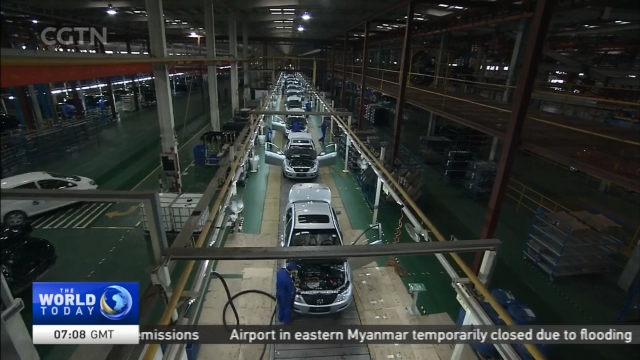
15:27, 28-Jun-2018
Domestic Auto Production: China pays its price opening up auto sector
Updated
14:58, 01-Jul-2018
02:42

It's been 17 years since China became a member of the World Trade Organization. And while that entry meant a huge opportunity for many Chinese industries, back then concerns were high among domestic automakers, as they were going to face foreign competition. CGTN's Cui Hui'ao spoke to an economics professor in Guangzhou and tells us more.
When China joined the WTO, the country made a number of promises to open its auto market. Reducing tariffs, phasing out import license requirements and easing of restrictions on distribution practices were among them. Yet the provisions of the trade pact posed a daunting challenge for domestic automakers.
LIN JIANG, PROFESSOR OF ECONOMICS ZHONGSHAN UNIVERSITY "At that time, the fear was WTO accession would result in imports crowding out domestic products. In fact, that did happen. One example, a brand called Fu Kang that did well in the 90s, but later disappeared as it failed to compete with foreign manufacturers."
In retrospect, Professor Lin says China has fulfilled its promises to open up the auto sector. Case in point - tariff reduction. Over the last 17 years, China's import tariff for vehicles has dropped from 80 percent in 2001 to just 25 percent today. And just recently, Chinese authorities announced they will further cut tariffs from 25 to 15 percent beginning next month.
LIN JIANG, PROFESSOR OF ECONOMICS ZHONGSHAN UNIVERSITY "There is no question that China's openness to foreign automakers spelled big success for joint venture brands like Toyota, and SAIC Vokswagen. But we also have to admit protective measures still exist which limit the full participation of foreign producers."
Now, the Chinese government is trying to make things easier for foreign brands. But how will that change the landscape of domestic auto production?
CUI HUI'AO GUANGZHOU "Massive cuts to car tariffs, along with other relaxation policies like lifting restrictions on foreign ownership in the sector, are likely to present even bigger challenges for domestic automakers."
LIN JIANG, PROFESSOR OF ECONOMICS ZHONGSHAN UNIVERSITY "It is more important than ever to step up production, and learn from our rivals. For instance, some domestic electric vehicle makers put their focus on battery systems, whereas foreign automakers are studying how to recycle energy."
In other words, competition will step up now with the further opening up of the auto market. But one good thing: the catfish effect. It means domestic production may not stand still, but rather, accelerate their pace of innovation and reform. Cui Hui'ao, CGTN, Guangzhou.

SITEMAP
Copyright © 2018 CGTN. Beijing ICP prepared NO.16065310-3
Copyright © 2018 CGTN. Beijing ICP prepared NO.16065310-3